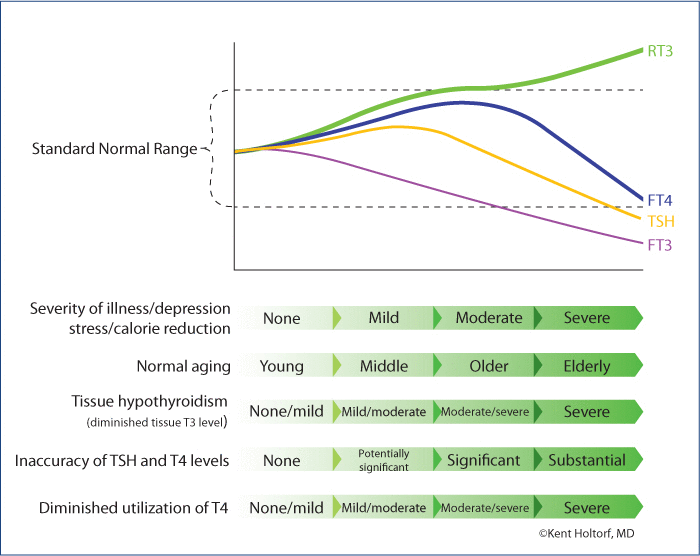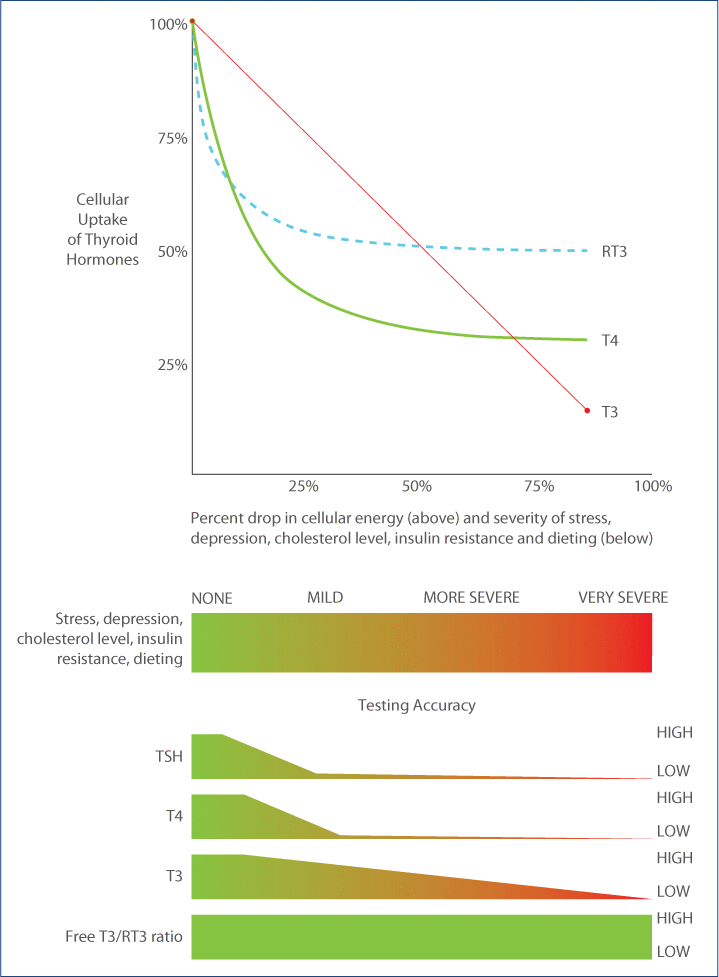Is your thyroid cooked?
A look at the nuanced science behind the master metabolism regulator
At Patchwork, when we do a nutrigenomic screening, we'll always welcome any additional context or tests that users have and want to share with us.
One that is of particular interest to us and the discussion of which comes up every time we do a consult is someone's thyroid numbers.
Time and time again, users come to us and say they feel cold, they feel sluggish, they can't pull energy from their food, but their doctor is convinced that there's nothing wrong with their thyroid.
And having read more countless books and several hundred papers on thyroid, I wanted to share some of the science that I know and that has formed my view on how the thyroid works and how to really diagnose if something is going on there.
The problem with TSH
You might know that TSH (Thyroid-Stimulating Hormone) is the hormone that we use to measure hypothyroidism.
But what you probably don't know is that TSH isn't actually made by your thyroid. It's made by your pituitary gland.
And this is where things can get a bit tricky.
If your pituitary gland isn't functioning optimally, it might not be producing enough TSH, leading to a false negative on a traditional TSH test.
Furthermore for your pituitary gland to release TSH, it needs feedback from the body that it needs more thyroid hormone. This feedback is mediated through the hypothalamus, which releases thyrotropin-releasing hormone (TRH) to stimulate the pituitary gland. If there's any dysfunction in this feedback loop, it can result in an inaccurate TSH reading.
So relying solely on TSH levels may not provide a comprehensive picture of thyroid health.
And if your curious - before TSH, the medical establishment used to be obsessed with a test for something called PBI (Protein-Bound Iodine) as a measurement for hypothyroidism, which was proven totally unreliable after 30 years of use!
To get a more accurate assessment, it's important to consider other thyroid hormones like free T4 and free T3, as well as clinical symptoms and patient history.
But what if your cells are resistant to T3 uptake?
What if your liver is damaged or running slow (from say...a lack of choline) and T4 is not converting to T3?
What if you have a history of aggressive dieting and your body suppresses T4 to T3 production?
I wanted to share some studies that further the issues with TSH and aggressive dieting on the whole.
What excessive dieting does to your Thyroid
It seems like every day I see an argument erupt on weight loss reddit over whether "starvation mode" exists.
It's borderline comedy at the point because we know this:
less than 3% of Americans who successfully lose weight keep it off
when properly tracked aggressive diets lead to rapid reductions in TDEE
dieting the first couple times seems to work but always seems to stop working
Could it be due to some of the science below?
Effect of long-term calorie restriction with adequate protein and micronutrients on thyroid hormones
The Journal of Clinical Endocrinology & Metabolism, Volume 91, Issue 8, 1 August 2006, Pages 3232–3235, https://doi.org/10.1210/jc.2006-0328
In this study published in 2006 scientists found that long-term calorie restriction, even with adequate protein and micronutrients, resulted in decreased levels of T3 and T4 hormones. This suggests that aggressive dieting can directly impact thyroid function, leading to a slower metabolism and potentially hindering weight loss efforts.
When calories returned to maintenance - T3 levels remained 20% suppressed. By all accounts, the study showed that participants sliced off 20% off their metabolism somewhat permanently.
The effect of caloric restriction and glycemic load on measures of oxidative stress and antioxidants in humans: results from the CALERIE trial of human caloric restriction
Caloric Restriction and Glycemic Load on Measures of Oxidative Stress and Antioxidants, Published: 11 January 2011, Volume 15, pages 456–460, (2011)
Another study titled "The effect of caloric restriction and glycemic load on measures of oxidative stress and antioxidants in humans: results from the CALERIE trial of human caloric restriction" published in 2012 found that caloric restriction led to a decrease in T3 levels, further supporting the notion that extreme dieting can negatively affect thyroid function.
Again in this study - when calories returned to maintenance - T3 levels remained 20% suppressed. Participants sliced off 20% off their metabolism somewhat permanently.
Thyroid Hormone Transport into Cellular Tissue
Journal of Restorative Medicine, Volume 3, Number 1, 4 January 2014, pp. 53-68(16)
Another study, titled "Thyroid Hormone Transport into Cellular Tissue" published in 2014, delved into the mechanisms behind thyroid hormone transport and its implications for overall thyroid function. This study shed light on how disruptions in this process, such as those caused by extreme dieting, caloric restriction and aging, can lead to long-lasting changes in metabolism and hinder weight loss efforts.
The study found that caloric restriction not only affects T3 levels but also disrupts the transport of thyroid hormones into cellular tissue, which can have long-lasting effects on metabolism. This suggests that extreme dieting can lead to metabolic adaptations that make it difficult to lose weight and maintain weight loss in the long term.
Furthermore, the study highlighted the limitations of using TSH as a sole diagnostic tool for hypothyroidism in individuals with a history of stress or aggressive dieting. It emphasized the importance of considering other factors, such as symptoms and comprehensive thyroid hormone testing, to accurately diagnose and manage thyroid disorders in these populations.
In the image above - it doesn't take much for TSH & T4 levels to be an inaccurate indicator of thyroid function and metabolism.
Or put another way - the more stress you put your body under, the lower the utilization of T3 hormones and thus most thyroid markers are rendered useless.
Bear in mind that in a modern environment our bodies are under attack from an endless stream of environmental stress, where each stressor may be minor but incremental in increasing the overall load.
This is further displayed in the image below
The surprising finding in this study, to me at least, was the authors clear guidance on how to diagnose hypothyroidism given this context - and is how we now think about it at Patchwork.
"Additionally, the most rigorously screened individuals for absence of thyroid disease have a TSH below 2 to 2.5 mU/L. Thus, treatment should be considered in any symptomatic person with a TSH greater than 2 mU/L. As discussed, a free T3/rT3 ratio below 0.2 is a useful indicator of low tissue thyroid levels. Additionally, a relatively low SHBG, a slow reflex relaxation time, a low resting metabolic rate (metabolism), and a low basal body temperature can also be useful indicators of low tissue thyroid levels and can aid in the diagnosis of tissue hypothyroidism."
Ways to diagnose:
Symptomatic and TSH above 2
T3/rT3 ratio below 0.2
Relatively low SHBG
Slow reflex relaxation time (ankle test)
Low resting metabolic rate
Low basal body temperature
For context - my thyroid numbers have been all over the place but since mega dosing raw desiccated thyroid my numbers finally looked healthy this year.
I do however have a low metabolic rate, low basal body temperature and a T3/rT3 ratio of 0.2 exactly WITH natural supplementation. Something I continue to work on.
Conclusion
You don’t have to be a conspiracy theorist to read up on thyroid and see why doctors so often get it completely wrong. If there is one part of your health to which you should fully take control, it is your thyroid. It drives everything.
Next time you do bloods, or your physical is due. Demand that free T3 and reverse T3 get tested too.
The maths on the ratio is simple, but just to be sure - Patchwork is building an easy calculator to check.






I’d be curious if they studied bodybuilders. Not necessarily the hulking mass monsters but regular gym bros. I myself have been dieting every late winter early spring to get down to 6-7% body fat for decades now. No metabolic issues whatsoever, though it’s got harder to maintain over 50. When I was younger I remember getting bored with my 6 pack and decided to just eat more once.